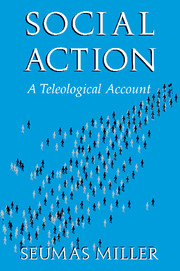3 - Conventions
Published online by Cambridge University Press: 04 December 2009
Summary
In this chapter I will provide an account of one of the main categories of social action, namely actions performed in conformity to conventions. I have already suggested that while joint actions are not necessarily social actions, nevertheless the concept of a joint action is of fundamental importance in the understanding of social action. In this chapter I make good on this claim. For I will argue that conventions are in fact a species of joint action.
Conventions play a large part in our collective lives. When we exchange money for goods, we do so in conformity to conventions. Our mode of dress and manner of eating is largely determined by convention. When we perform linguistically our actions are governed by conventions. The ubiquity of conventions suggests that an analysis of the concept of a convention would have an important place in the attempt to understand social phenomena.
We find that philosophers, in particular, have used the idea of a convention freely and widely. Historically, the so-called social contract theorists, such as Hobbes and Locke, invoked the notion of a convention, and related notions of an agreement or contract, to provide the moral justification for obedience to government and the law. Rousseau put the proposition that political inequality depended on a kind of convention. More recently, philosophers have offered conventionalist accounts of analytic truths, for example, and rival theorists of speech acts have argued about whether speech acts are essentially conventional (or rule-constituted).
So philosophers have employed the notion of a convention to make substantive claims, where the truth of these claims turned crucially on what exactly that notion of a convention was.
- Type
- Chapter
- Information
- Social ActionA Teleological Account, pp. 91 - 122Publisher: Cambridge University PressPrint publication year: 2001



